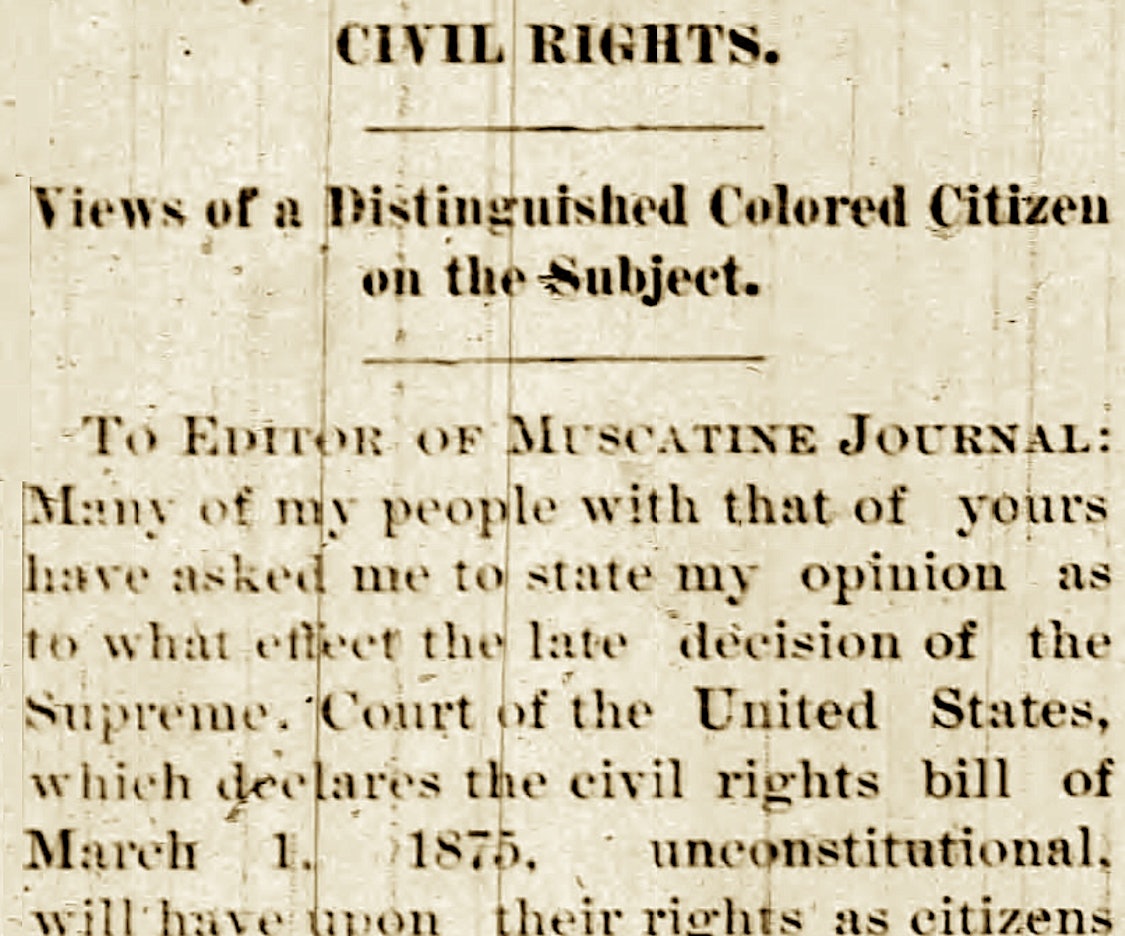
This column by Daniel G. Clark about Alexander Clark (1826-1891) first appeared in the Muscatine Journal on October 4, 2023.
The longest writing I’ve seen by Alexander Clark appears on page 1 of this newspaper two days after Christmas 1883.
The editors give the title “CIVIL RIGHTS” with subtitle “Views of a Distinguished Colored Citizen on the Subject.”
Apparently their readers knew enough—and cared enough—about the subject to slog through two full-length columns, most of the non-advertising content of the page. His letter comes to well over 2,000 words, maybe as much as three times my column here.
In October 1883—140 years ago—the U.S. Supreme Court struck down the main provisions of the Civil Rights Act of 1875 intended to assure equal access to public accommodations.
By an 8-1 decision, the Supreme Court ruled that the 1875 Civil Rights Act was unconstitutional. Neither the 13th or 14th amendments empowered Congress to pass laws that prohibited racial discrimination in the private sector. The 14th Amendment, read narrowly by the Supreme Court, applied only to state, not individual actions. … The Supreme Court also emphasized at the end of its decision that the time had come where former slaves were to be considered normal citizens rather than a special group favored by the law.
The ruling proved a decisive end to the Reconstruction era. It set the stage for coming generations of Jim Crow laws in the South and gave permission for racial discrimination nationwide. Federal law comparable to the 1875 act would not pass again until the 1960s.
Iowa’s leading paper presented a short version of Clark’s prescient views.
Iowa State Register, December 29, 1883: “Mr. Alexander Clark, the noted colored man of this State, has a two column letter in the Muscatine Journal discussing the late decision of the [U.S.] Supreme Court on the Civil Rights Bill. The letter is both strong and earnest. We are without room to print it all as we would like to do.”
The Register reprints this passage:
Yes, their mistake is fatal, because it will frame mischief. It is in the interest of State’s rights (State Sovereignty) and Federal subordination. This accursed doctrine or dogma was rebuked by President Jackson with a forcible threat to hang the author, J.C. Calhoun. It was overthrown by the war for the union and now it comes to the nation again in the name and under the cover of the civil rights decision of the Federal court. Now I hope that the patriotism and loyalty of the nation will rise in their strength and by popular opinion overthrow this dangerous doctrine. Let the constitution be amended to meet the growing needs of the national sovereignty not in the interest of colored men or white men, but in the interest of this great government of 60,000,000 of free men, and I heartily endorse the proposed sixteenth amendment to the constitution as offered by Hon. J.F. Wilson, of Iowa, in the Senate, or any other that will maintain the sovereignty of the government and will forever set at rest this dangerous doctrine … which has given the nation so much trouble and bloodshed and may again bring war and all its evils.
More from Clark’s long letter:
Now I am not willing to rest this question on what I have said or could say, as I am no lawyer, but this much I have learned—the burden of proof rests upon the affirmative or accusing party. Now these seven wise men, as judges of the highest tribunal of the nation, under oath, have made a grave charge upon the people’s rights in declaring the civil rights bill unconstitutional; and I arraign them before the legal lore of the nation who were acting under oath on this grave question. Now let us compare these seven wise men or judges with the 38 Senators and the 162 Representatives of the 42nd Congress.
Legal lore? A grandeur above petty judges.
He recites a litany of those he views as the wiser men; from Senator Charles Sumner who drafted the 1875 act to President Ulysses Grant who signed it and many in between, including Grant’s Secretary of War William Belknap of Iowa and former Representative R.H. Cain of South Carolina (the one-time Muscatine pastor and Clark mentor).
Notice he says he is not a lawyer—but does not mention that he will very soon become one.
The Vidette-Reporter, State University of Iowa, February 2, 1884: “We had the pleasure of perusing a very able article on the Civil Rights question, written by Mr. Alexander Clark, a member of this class, and published by the Muscatine Journal. The article sustains the dissenting opinion of Justice Harlan.”
Kentuckian John Marshall Harlan (1833-1911) championed civil liberties ahead of his time and earned the nickname The Great Dissenter.
My favorite new discovery: James Falconer “Jefferson Jim” Wilson (1828-1895). Wow! Another Iowa equal-rights hero. I predict he’ll get his own column soon.
Next time: Debut of the Susie Clark picture book

4 Comments
Clark's entire letter
https://www.newspapers.com/article/the-muscatine-journal-alexander-clark-le/131126291/
Iowapeacechief Tue 20 Feb 1:21 AM
Thanks--added that link
the story above.
Laura Belin Tue 20 Feb 7:44 AM
thanks for sharing this
remarkable that they published it and how long and deep the history of the politics of respectability is
dirkiniowacity Tue 20 Feb 12:01 PM
To dirkiniowacity
I would be interested in reading a little more about how “the politics of respectability” applies to the post above.
PrairieFan Thu 22 Feb 3:42 PM